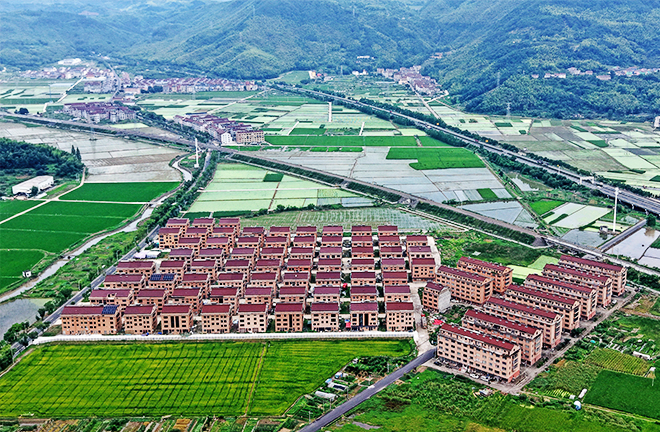Balancing key relationships to empower major economic provinces

An aerial view of Guangming Village in Linhai City, Zhejiang Province, which features neat houses, a good ecological environment, and thriving industries Photo: IC PHOTO
On the new journey toward building a modern socialist country in all respects, major economic provinces are the central pillars underpinning the national economy. To sustain and guide China’s long-term development, these provinces must carefully balance three key relationships and respond thoughtfully to three fundamental questions: who should shoulder responsibility, what that responsibility entails, and how it should be fulfilled. Only by achieving tangible outcomes in high-quality development can they effectively support the broader national agenda.
Balancing regional and national development
The call for economic powerhouses to “play a major role” or “shoulder the main responsibility” reflects the application of systems thinking to the relationship between regional and national development. It highlights not only the vital contributions of major economic provinces but also the importance of national-level strategic coordination and active participation by other provinces. The 2024 Central Economic Work Conference underscored the importance of “supporting major economically developed provinces to play major roles and encouraging other regions to leverage their local conditions and advantages.” This requires careful coordination of interactions between major economic provinces and the central government, between major provinces and other provinces, and among the powerhouses themselves.
The “major” status of economic powerhouses lies first and foremost in their contribution to overall national development. As both the principal actors and direct bearers of this responsibility, they must serve as engines of coordinated regional development and strive to deliver greater value to the country as a whole.
Enhancing mechanisms for win-win cooperation will help boost the overall effectiveness of major economic provinces in fulfilling their role. At present, regional disparities in development remain prominent, making it imperative to refine and optimize assistance, cooperation, and spillover and driving mechanisms between powerhouse provinces and others. This, in turn, will unlock endogenous momentum for high-quality development in other provinces.
Coordinating economy with society, culture, ecology
Amid profound changes in both domestic and international macroeconomic landscapes, the strategy of having major economic provinces play a leading role has evolved from a contingency measure aimed at rapid economic recovery to a long-term, institutionalized approach aligned with China’s high-quality development objectives.
While maintaining stable economic growth remains a core responsibility, it by no means represents the only one. Major economic provinces must not only serve as anchors for steady macroeconomic progress to ensure the smooth achievement of predetermined development targets, they must also take the lead nationally in advancing high-quality development across social, cultural, ecological, and other domains, thereby achieving comprehensive, coordinated, and high-quality progress across all sectors.
Leveraging breakthroughs in key areas to spur broader development
To drive economic and social development, major provinces must learn to skillfully identify and address principal contradictions, leveraging breakthroughs in key areas to spur broader development. At the same time, they must ensure coordinated advancement across all domains, avoiding a narrow focus on isolated achievements. Progress in specific areas must be harmonized with overall development to create a dynamic and multidimensional path toward high-quality growth.
Key areas where breakthroughs can catalyze nationwide progress include: integrating scientific and technological innovation with industrial transformation, deepening reform and expanding high-standard opening up, implementing major national development strategies, and promoting common prosperity for all.
Equally important is the need to promote balanced development through a systems-oriented approach. While sustaining momentum in priority areas, major economic provinces must adopt a holistic mindset that accounts for the interconnections and synergies among policies and measures. Through enhanced policy coordination and impact evaluation, they can ensure synchronized progress in scientific and technological innovation, industrial upgrading, regional coordination, the green transition, and livelihood improvement—all of which must move forward in tandem to foster a virtuous cycle of mutually reinforcing, integrated development.
Shang Qingfei is president of the JiangSu Provincial Academy of Social Sciences.
Edited by CHEN MIRONG
